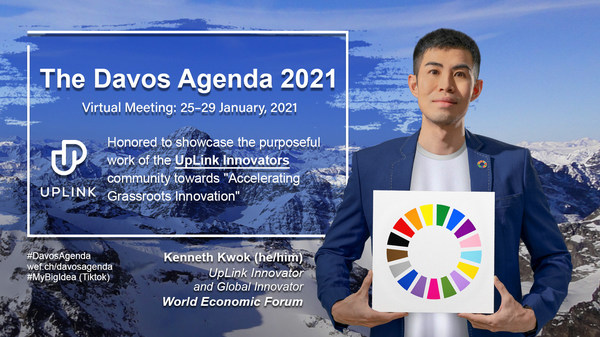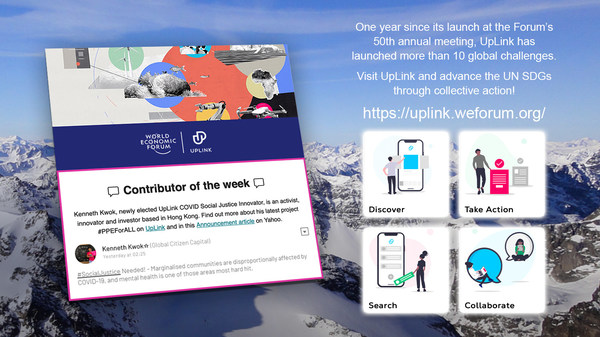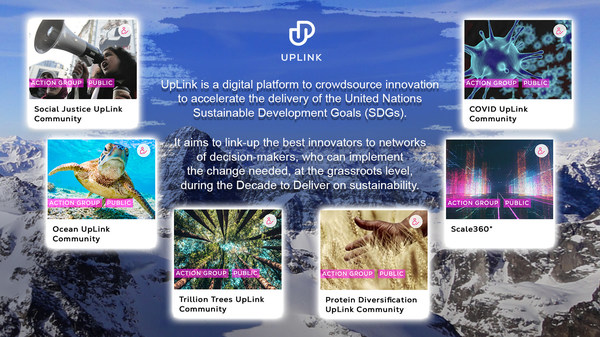Family Mask's #PPEforALL and UpLink: Accelerating Grassroots Innovation to Reset, Recover and Rebuild in the Post-Pandemic World
HONG KONG,Jan. 20,2021 -- The COVID-19 pandemic in 2020 has delivered the greatest shock to the global economy since World War II. Entire societies have been locked down,and people everywhere have had to adjust to new ways of working,studying,socializing,and entertaining themselves. Still,more than one million people have died worldwide,and unemployment,inequality and poverty have soared. The globalized economy,a lifeline to billions of people in recent decades,has suddenly become a source of vulnerability,owing to the disruption of far-flung supply chains and governments' protectionist efforts to safeguard national markets above all. As such,there is an urgent need for global stakeholders to cooperate in simultaneously managing the direct consequences of the pandemic,and this cooperation can be found within the UpLinkCommunity.Kenneth Kwok,Co-Founder and CSO of Family Mask,shares his vision for UpLink's important role in accelerating systemic change in 2021 and beyond.

Kenneth Kwok,World Economic Forum UpLink and Global Innovator,aims to advance the intersectionality of #impact,#innovation and #inclusion

Representing Global Citizen Capital,Kenneth Kwok is elected as an UpLink Innovator for the Social Justice Community

Since its launch at Davos annual meeting 2020,UpLink has hosted 10 global challenges on the world’s most pressing issues.
"By pairing the World Economic Forum's unrivalled ability to convene leaders from across all stakeholder groups with UpLink's potential for massive,open-source participation,we have created a unique formula for catalyzing the knowledge,ideas and actions necessary to solve our world's greatest development challenges," said Professor Klaus Schwab,Founder and Executive Chairman of the World Economic Forum.1
Since its launch at World Economic Forum's 50th annual meeting in Davos,UpLink focused on crowdsourcing innovations,in an effort to advance the delivery of the UN SDGs and contribution to the global public good. The core objective is to link-up the best innovators to networks of decision-makers,who can implement the change needed for the next decade. As a global platform,at the end of 2020,UpLink has launched 10 global innovation challenges. Members from more than 170 countries have submitted 915 solutions to tackle some of the world's most pressing issues,generation more than 50 million views on social media. Its community of innovators has one shared purpose: accelerating grassroots innovations through community-led solutions for inclusion-led sustainability.
There is no doubt that the "social economy",empowered by global initiatives such as UpLink,has played an important role in addressing and mitigating the short- and long-term impacts of the COVID-19 crisis on economy and society. In the short term,social economic actors have assisted the recovery from the crisis by providing innovative solutions that are aimed at strengthening public services to complement government action. In the long term,social economic organisations can and will help reshape the post-crisis economy by promoting inclusive and sustainable economic models. Relying on decades of know-how,specific features and underlying principles,the social economy can inspire models of social innovation and a sense of purpose to firms operating in the market economy.
What makes UpLink and its multi-stakeholder approach to innovation remarkable is that this community evolved together,through a hybrid of serendipity and intentionalism,as a direct response to COVID-19. UpLink's formidable strength comes from its networks of community groups,activists,and researchers who have been innovating grassroots solutions for social justice and environmental sustainability for decades. Unencumbered by disciplinary boundaries,policy silos or institutional logics,grassroots solutions often arise in unconventional settings through unusual combinations of people,ideas and tools. UpLink provides a platform to unleash entrepreneurs and innovators on the world's toughest problems,especially in areas when existing systems and practices fail to serve people's needs. It is a modality of inclusive innovation that enables extremely affordable,niche-adapted solutions to local problems,often created by filling the network gap led by systemic inequalities.
"The Forum has a long tradition of seeking insights and world-renowned innovations from across the globe," noted John Dutton,Head of UpLink,World Economic Forum. "This has been a multigenerational and local effort.With UpLink,we are looking to continue along this trajectory and go beyond the traditional ecosystems of leaders by democratizing the search for innovative solutions," he added.2
It is clear that consensus building and collective action is requiredto convert the ideas and innovations of knowledge-rich but economically poor individuals and communities into viable means of raising income,addressing social needs,and conserving the environment. Unless we build on the resources in which poor people are rich,the development process will not be dignified and a mutually respectful and learning culture will not be reinforced in society.
At the same time,our community has to realize that,even with access to the best pool of resources and networks,accelerating grassroots innovation is not a guaranteed smooth-sailing journey. Simple answer is: it is tough. A more objective answer is: it requires a coherent and holistic hand-holding ecosystem to be built around it for sustenance. Historically speaking,more than 95.0% of well-intentioned projects and ideas simply just fizzle out. Some do not get the necessary technological mentoring,some do not receive any go to market and business insights,and for some,it is impossible to scale to a large manufacturing facility. What is needed,and where the UpLink community can lead by example,is building a global holistic ecosystem which supports grassroots innovators to stand-up,start-up and scale-up,in order for their innovations to become self-sustaining and growing businesses. From the perspective of Global Citizen Capital,here are six ways to achieve this:
1) Encourage the applications of micro-finance and impact investment
Supporting the incubation of grassroots innovations requires financial resources,and all financing mechanisms available to further grassroots innovations must be considered. Traditional sources such as venture capital,start-up schemes and innovation funds to emerging sources such as impact investment,outreach programs and value addition research and development funds are all potential avenues for fundraising. Public-sector support for validation and value addition of grassroots innovation and establishment of creativity and training laboratories can be a purposeful addition. The UpLink platform already has actors belonging to the aforementioned stakeholder groups within its community for deployment.
2) Foster a community to share research,know-how and talent
To have an innovative society,it is imperative to promote innovation mindsets that,among others,encourage individuals to search for solutions and be creative. A basic principle of grassroots innovations is to not depend on external systems and incentives for solving local problems. The use of mass media can also be very powerful to popularize innovation mindsets. Whether innovation is induced through an autopoiesis,heteropoiesis or contractual co-operative model,UpLink and its community of innovators have individually and collectively built up tremendous track-records to co-create.
3) Provide technological mentorship towards advancing a circular economy
It is important to remember that innovators may not necessarily be entrepreneurs,and that they may not be interested,have the resources or the required skills. When the innovator is not able or interested in becoming an entrepreneur,the technology can be licenced or transferred to interested entrepreneurs that could commercialize it,or the entrepreneurs can provide mentorship to facilitate development. As such,a community such as UpLink which can actively build bridges connecting members of formal science,technology and innovation institutions with seasoned technology entrepreneurs and customers is important. More than that,UpLink can serve a second critical role in ensuring these partnerships adhere to the circular economy model and deliver on the UN SDGs.
4) Develop a robust business case and ready for go-to-market phase
Prior to developing a business case,it is critical to first screen the ideas for novelty. Many of the grassroots innovations are crude and need prototyping,refinement and validation,and feedback from customers and experts in the field is required. Owing to their small markets,many grassroots innovations may require small production lines. Yet,small production lines still need to be streamlined to,for example,ensure that innovators procure standard and easily available components. After the enterprise is well established,suitable scaling up strategies may be devised,and at this stage,a robust network of markets,public institutions and civil society organisations is necessary to connect producers with consumers. Throughout this entire process,as evidenced across numerous global innovation challenges,UpLink has the bandwidth to connect the required dots and to build up sustainable value chains for accelerating social-economic change.
5) Localize the context of innovation to support disadvantaged communities
It is a fact that not all grassroots innovations have the potential to be commercialized. When demand is scattered,small and fluctuating,there is limited potential for commercialisation of specific innovations. At the same time,the social impact of these innovations could help address the needs of disadvantaged communities,in particular in the local setting. To support the social diffusion of grassroots innovations,one must first generate awareness about existing solutions. Creating such awareness,showing how the innovations can help people overcome their constraints and improve their productivity and income,and crowdsourcing investment and other resources are core pillars of the UpLink platform.
6) Mobilize academia and youth to keep driving the momentum forward
Linkages between grassroots innovators and academia and youth civil society are essential for innovations to be identified,validated,recognized,developed and diffused. Youth approach problems unencumbered by experience,and as such they can often find ingenious solutions to problems that bedevil adults. For undergraduate and graduate students,it is increasingly evident that tackling real life social problems,such as gender inequality,systemic racism and LGBTI discrimination,is at the core of their pursuit of global citizenship. One of the silver linings of the pandemic is that there has not been a time in recent history where youth are more fired up about making a positive impact. UpLink,with its truly global multi-stakeholder appeal backed by the world's most prominent organization facilitating public and private partnerships,is in the most ideal position to mobilize intergenerational response to our changing world order.
Between January 25 – 29,2021,World Economic Forum will host Davos Agenda2021,and "Accelerating Grassroots Innovation" will have two dedicated sessions. As a session contributor,I will be speaking on the need to echo the urgent calls for a re-balancing of efficiency and resilience throughout the economy. Traditionally,the purpose of grassroots innovation has been seen to "repair" social problems. As we now know,innovation can develop a much larger role in the post-COVID world to inspire transformation to a more inclusive and sustainable economy and society. This includes a focus on economic practices which are sustainable and inclusive,which (i) addresses societal (i.e. social and/or environmental) needs,(ii) organises economic activities building on local roots,as well as using participatory and democratic governance,and (iii) works in close co-operation with other economic actors and relevant stakeholders. With mounting pressure for social justice and cohesion in an increasingly unequal world,we are urged to explore how to foster more inclusive innovation. In this context,grassroots experiences take on added significance in collecting and facilitating timely and relevant ideas,analysis and recommendations. Accessible and available for all,UpLink is the leading platform for activists,policy-makers,students and scholars interested in encounters between innovation,development and social movements,to to collectively deliver on the UN SDGs.
One Final Note: Pleasejoin us on TikTok for UpLink's #MyBigIdea Campaign. For more information,please visit here.
Source:
https://www.salesforce.com/news/stories/uplink-a-digital-platform-to-help-meet-sustainable-development-goals-to-arrive-following-collaboration-from-wef-salesforce-and-partners/
https://www.wired.com/wiredinsider/2020/05/can-happen-brightest-minds-collaborate-climate-change/